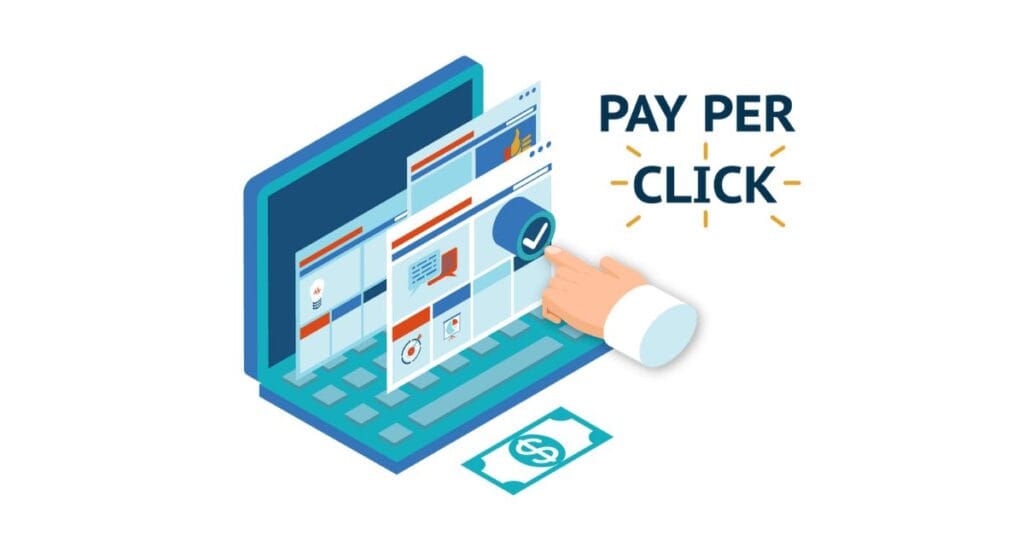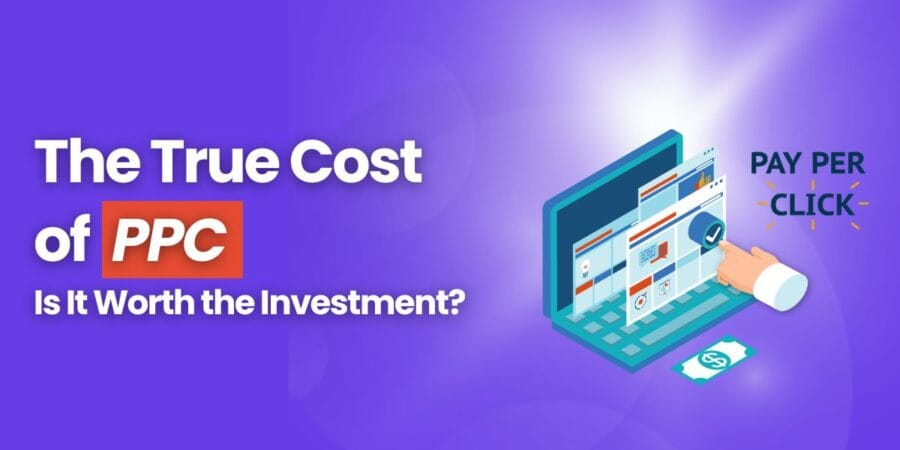Understanding the cost of PPC (pay-per-click) advertising is crucial for businesses looking to enhance their online presence and drive immediate results. This marketing strategy can effectively attract targeted traffic, but it’s essential to grasp its financial implications before diving in. In this article, we will explore the cost of pay per click advertising, what influences these costs, and whether investing in PPC is a smart move for your business.
What Is PPC?

Pay-per-click (PPC) advertising is a digital marketing model where advertisers incur a fee each time a user clicks on their ad. This approach allows businesses to bid on specific keywords or phrases that are relevant to their target audience. When someone searches for these keywords, the ads are displayed on search engine results pages (SERPs) or on various platforms such as social media and websites.
The primary advantage of PPC campaigns is that advertisers only pay when a user actually clicks on their ad, which is why it’s referred to as pay-per-click. Unlike search engine optimization (SEO), which can take time to improve website rankings, PPC ads can achieve immediate visibility in SERPs. This means your business can quickly reach potential customers and drive traffic to your site.
Essentially, PPC is a method of purchasing visits to your website rather than relying solely on organic traffic. This strategy allows businesses to gain fast exposure and connect with users actively searching for related products or services.
What Impacts the Cost of PPC?
The cost of PPC (pay-per-click) advertising can vary based on several key factors. Here’s a simplified overview of what influences these costs:
1. Expertise
If you want to run a complex campaign, especially one that targets an international audience or multiple platforms, you may need to hire an experienced PPC specialist. This expertise can increase your overall costs.
2. Keywords
Targeting high-demand keywords can significantly raise your costs. If you aim for popular keywords, be prepared to invest more time, resources, and money to achieve good rankings.
3. Number of Campaigns
Running multiple campaigns at the same time requires more time and resources, which can increase your overall expenses.
4. Types of Campaigns
Different types of PPC campaigns require different skills and resources. For example, managing a display ad campaign needs different expertise compared to a search ad campaign, so consider this when budgeting.
5. Advertising Platforms
Costs can vary depending on the platform you choose to advertise on. Some platforms, like Google Ads, tend to be more expensive due to higher competition, while others may offer lower costs.
6. Ad Quality
Creating high-quality ads takes time and effort. Investing in testing and refining your ads can increase costs, but it often leads to better results.
How Much Does PPC Cost? (Cost of PPC)

The cost of PPC can vary widely based on factors such as industry competition, target audience, and the advertising platforms used. Here’s a detailed breakdown of what you might expect when budgeting for a PPC campaign:
PPC Management Costs: If you choose to partner with a management agency, expect charges between 12% and 30% of your monthly ad spend. Alternatively, managing PPC in-house will vary based on the size and expertise of your team.
Average Cost Per Click (CPC): The typical range for CPC is between $0.11 and $0.50. However, in highly competitive sectors, this cost can increase significantly.
Cost Per 1000 Impressions (CPM): For CPM, businesses usually see costs ranging from $0.51 to $1.00.
Monthly Ad Spend: Companies often allocate anywhere from $100 to $10,000 or more each month for PPC campaigns, depending on their size and marketing objectives.
Breakdown of Costs
| Item | Cost Range |
|---|---|
| Ad Spend | $100 – $10,000+ per month |
| PPC Tools & Software | $15 – $800 per month |
| PPC Management (Agency) | 12% – 30% of ad spend |
| PPC Management (In-House) | Varies based on team size |
What Influences the Cost of Pay Per Click Advertising?
Understanding the cost of pay per click advertising requires recognizing the various elements that impact pricing:
- Keyword Competitiveness: Targeting high-demand keywords can significantly raise your costs due to increased competition among advertisers.
- Industry Variability: Different industries have varying average CPCs; for example, legal and finance sectors often see higher costs than retail or hospitality.
- Ad Quality: High-quality ads that attract clicks can lower costs through improved ad placements and reduced CPCs.
- Campaign Complexity: Running multiple campaigns or utilizing diverse ad formats increases the resources needed and thus raises overall costs.
- Management Expertise: Employing skilled professionals or agencies can lead to higher initial expenses but may result in better performance and ROI over time.
Understanding PPC Economics
To truly appreciate the cost of PPC, it’s essential to grasp the economics behind it. PPC operates on an auction system where advertisers bid on keywords relevant to their target audience. Here’s how it works:
- Bidding Process: Advertisers set bids for keywords they want to target. The higher the bid, the more likely their ads will be displayed when users search those keywords.
- Quality Score: Google and other platforms assess ad quality through a metric called Quality Score, which considers factors like click-through rates (CTR), ad relevance, and landing page experience. A high Quality Score can reduce your CPC.
- Return on Investment (ROI): The ultimate goal is to achieve a positive ROI by ensuring that the revenue generated from clicks exceeds the total cost incurred from running the ads.
Is Pay Per Click Advertising Worth It?
The cost of pay per click advertising can vary significantly based on several factors, including the platform used, competition for keywords, and the specific industry. Here’s a breakdown of what you can expect:

- Average Cost Per Click (CPC): The average CPC for Google Ads is around $2, while Facebook Ads hover around $1.86. However, costs can range from as low as $0.11 to over $30 per click depending on competition and keyword demand.
- Monthly Ad Spend: Small businesses typically spend between $1,000 to $10,000 monthly on PPC campaigns. Larger enterprises may allocate even more, sometimes exceeding $250,000 per month.
- PPC Management Costs: If you hire a management agency, expect to pay between 12% and 30% of your ad spend for their services. In-house management costs will vary based on team size and expertise.
Benefits of Pay Per Click Advertising
PPC advertising offers numerous advantages that make it a compelling option for businesses looking to enhance their online presence:
- Immediate Results: One of the standout advantages of PPC is its ability to generate immediate traffic to your website. Unlike SEO strategies that may take months to show results, a well-executed PPC campaign can start bringing visitors as soon as it launches.
- Targeted Advertising: PPC allows advertisers to hone in on specific demographics, interests, and geographic locations. This precision ensures that your ads reach individuals who are more likely to convert into customers, thereby maximizing your return on investment (ROI).
- Flexibility and Control: With PPC advertising, you have complete control over your budget and campaign settings. You can adjust bids in real time, pause underperforming campaigns, or reallocate budgets based on performance metrics at any time.
- Measurable Outcomes: PPC provides robust analytics that enable businesses to track key performance indicators such as cost per action (CPA), conversion rates, and customer lifetime value (CLV). This data is invaluable for assessing campaign effectiveness and making informed decisions about future marketing strategies.
Average Cost of Pay-Per-Click Advertising
To provide a more concrete picture, here’s an idea of the average cost of pay-per-click advertising by industry:
| Industry | Average CPC |
|---|---|
| Retail | $0.70 – $1.20 |
| Legal Services | $6.00 – $10.00 |
| Insurance | $3.00 – $9.00 |
| Real Estate | $1.20 – $2.40 |
| E-commerce | $0.50 – $1.50 |
These figures offer a general guide but can fluctuate based on competition, keyword popularity, and seasonal factors. To truly assess the cost, consider testing a range of keywords and optimizing based on performance.
Different PPC Campaign Types and Their Costs
PPC advertising offers several types of campaigns, each with unique cost considerations:
- Search Ads: Typically the most popular, these ads appear on search engine results pages. CPC costs can be higher because of their high intent.
- PPC Display Ads: Display ads, shown across various websites, are often cheaper but may yield lower click-through rates (CTR).
- Video Ads: YouTube ads are highly visual and engaging but can be more costly due to production and placement costs.
- Shopping Ads: Used in e-commerce, shopping ads display products with prices and are popular but competitive.
Each campaign type has its advantages, so the choice will depend on your business goals, budget, and audience behavior.
Budgeting for PPC Marketing Tools
Alongside ad spend, PPC marketing tools like SEMrush, SpyFu, and Google Ads Editor are essential for maximizing campaign success. These tools, which typically cost between $15 and $800 per month, provide valuable insights into competitor strategy, keyword analysis, and performance tracking.
Is PPC Worth the Investment? Pros and Cons
Pros
- Instant Visibility: Unlike SEO, PPC brings immediate visibility to your brand.
- Targeted Advertising: PPC allows for precise targeting based on demographics, interests, and geographic location.
- Control Over Budget: You can set daily or campaign budgets to manage spending effectively.
Cons
- Costly for High-Competition Keywords: PPC can become expensive if you’re targeting highly competitive keywords.
- Requires Regular Monitoring: To maximize ROI, PPC requires ongoing monitoring and adjustments.
How to Maximize Your PPC ROI
To make the most of your PPC investment, focus on:
- Keyword Optimization: Regularly analyze keyword performance and exclude underperforming keywords.
- Ad Relevance and Quality Score: High-quality ads reduce CPC and improve ad position.
- Conversion Tracking: Monitor metrics like CTR, cost-per-acquisition (CPA), and conversion rate.
Managing PPC Costs Effectively
Managing costs efficiently requires setting realistic budgets, conducting keyword research, and using bidding strategies that align with your budget. Consider testing smaller campaigns before committing to large spends and adjusting based on results.
Using PPC Display Ads to Drive Conversions
PPC display ads are visually engaging and effective for raising brand awareness. While they often have lower CTRs than search ads, they’re cost-effective for retargeting users who previously visited your site, encouraging them to return and convert.
Exploring PPC Management Options (In-house vs. Agency)
Running campaigns in-house can save on agency fees but may require significant time investment. Agencies bring expertise and resources but often charge a percentage of your ad spend. Choose the option that best aligns with your budget and marketing goals.
Final Thoughts: Is PPC the Right Investment for You?
The cost of PPC can be substantial, but if planned and executed well, it can deliver impressive returns. PPC is a versatile strategy with immediate results, precise targeting, and scalability. Whether you’re a small business or a large enterprise, PPC offers a customizable solution that, with careful budgeting and strategy, can drive valuable results.



One comment
Pingbacks and Tracebacks
[…] Pay-Per-Click Advertising (PPC) […]